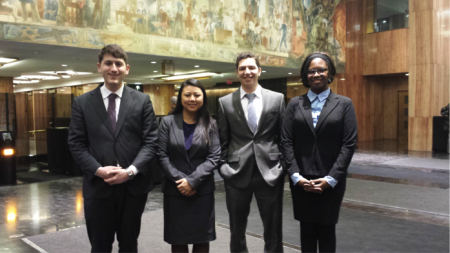Columbia Law School Human Rights Clinic Students Meet with U.S. State Department and UN Diplomatic Representatives to Discuss United States’ Human Rights Record
Columbia Law School students advocate for strengthened state and local implementation of human rights, and for access to counsel in civil cases

New York, February 26, 2015 —On February 20, 2015, four students in the Columbia Law School Human Rights Clinic—Glory Nwaugbala ’16, Daniel Pedraza ’16, Benjamin Setel ’16, and Audrey Son’15—traveled to Washington, D.C. to meet with U.S. government officials and U.N. diplomatic representatives in advance of an upcoming U.N. review of the United States’ human rights record.
Risa Kaufman, executive director of the Columbia Law School Human Rights Institute and lecturer-in-law, accompanied the team as they engaged in a civil society consultation hosted by the U.S. State Department and a dialogue with UN diplomatic representatives at Howard University School of Law.
The Columbia team raised two issues in these meetings: the importance of federal support for state and local implementation of human rights, and the crisis in unmet civil legal needs.
At the State Department, Daniel Pedraza and Reena Shah, the director of the human rights project at the Maryland Legal Aid Bureau, made a joint statement on the need for access to counsel in civil cases. “In the United States, millions of poor and low-income individuals must navigate the civil court system without legal representation,” Pedraza said. “Federal programs that provide civil counsel remain underfunded, and suffer from severe restrictions on the services that they can provide.”
On behalf of the Human Rights Institute, Risa Kaufman emphasized the importance of federal support for state and local implementation of human rights. Son, who helped draft the Institute’s statement, noted that “implementing human rights at the state and local level is crucial to ensuring the United States complies with its human rights obligations because an array of issues, ranging from housing to criminal justice, fall under state and local jurisdiction.” Yet, Son said, “There remains no federal focal point to coordinate and support state and local officials around human rights implementation, resulting in a lack of awareness of human rights.”
The State Department convened the government consultation with civil society, which brought together officials from numerous federal agencies and departments with U.S. advocates, in preparation for the United States’ upcoming second comprehensive review by the U.N. Human Rights Council in Geneva (known as the “Universal Periodic Review”).
Glory Nwaugbala commented on the value of the experience: “It was remarkable to see a range of advocates and government officials engaging in a substantive dialogue on current human rights issues, and more so to hear the constructive feedback from both sides.”
At the Howard Law School event, the Columbia team offered remarks following the plenary and then spoke one on one with U.N. diplomatic representatives to educate them about the importance of raising issues of state and local human rights implementation and access to justice during the upcoming review.
Ben Setel, who delivered a statement on access to justice noted: “It was an important opportunity to raise awareness of critical domestic human rights concerns with U.S. advocates, as well as with representatives from other countries, who want to learn what is happening on the ground.”
The Universal Periodic Review (UPR) is a unique mechanism overseen by the UN Human Rights Council and conducted as a peer review by all the UN member countries. Through this process, the human rights record of each UN member state is reviewed, based on reports from the UN, the country under review, and civil society. The United States is scheduled to undergo its second Universal Periodic Review on May 11, 2015.
Risa Kaufman supervises the student clinic team along with JoAnn Kamuf Ward, associate director of the Human Rights Institute’s Human Rights in the United States Project, and a lecturer-in-law at the law school. The students’ advocacy followed on two related reports submitted by the Columbia Law School Human Rights Institute to the UN Human Rights Council in September 2014. The clinic team is deepening the Institute’s larger advocacy efforts related to state and local implementation of human rights and access to justice.
About the Columbia Law School Human Rights Institute
Founded in 1998 by the late Professor Louis Henkin, the institute draws on the law school’s deep human rights tradition to support and influence human rights practice in the United States and throughout the world. The institute and the Human Rights Clinic have become increasingly integrated over the years, enabling us to multiply our impact on the field and engage students more fully in our work.
About the Columbia Law School Human Rights Clinic
The Human Rights Clinic is an intensive year long course that brings together human rights work, student education, critical reflection, and scholarly research. Students are trained to be strategic human rights advocates, while pursuing social justice in partnership with civil society and communities, and advancing human rights methodologies and scholarship. Through clinic projects addressing marginalized, urgent, and complex human rights issues around the world, students design and implement advocacy strategies, form partnerships with NGOs, write legal briefs, interview victims, and investigate abuses. The clinic is also a laboratory for testing and modeling innovative modes of human rights work.
For further information please contact:
Risa Kaufman (Executive Director, Columbia Law School Human Rights Institute)
Phone: (212) 854-0706
Email: [email protected]
Sarah Knuckey (Director, Columbia Law School Human Rights Clinic)
Phone: (212) 854-9583
Email: [email protected]
